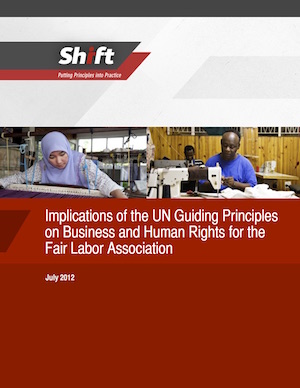
This analysis by Shift reviews the implications of the Guiding Principles for the work of the Fair Labor Association (FLA), a multistakeholder initiative focusing on workers’ rights.
Since this analysis was published in 2012, the FLA has made a number of changes to its standards and processes. | Also see our Collaborations page on this work
Following the adoption of the Guiding Principles in 2011, the Fair Labor Association (FLA) asked Shift to conduct a review of the implications of the Guiding Principles for its own work. Established in 1999, the FLA is a collaborative effort of universities, civil society organizations and socially responsible companies dedicated to protecting workers’ rights around the world.
The review was conducted through a high-level desk-based analysis of the FLA’s written policies and procedures, its programs, complaints mechanism, governance structures, and information on its website portal to identify correlations, strengths and weaknesses with regard to the Guiding Principles.
The review focused on the second pillar of the Guiding Principles – the corporate responsibility to respect human rights. This focuses on the kinds of policies and processes that a business needs to have in place in order to ensure that it avoids infringing on human rights and addresses any adverse impacts with which it is involved.
This review is not an assessment of the impact of the FLA’s work on the lives of workers; nor is it an assessment of how far company participants in the FLA meet the Guiding Principles. Rather, it focuses on what the FLA itself requires of its Participating Companies and how it knows and shows whether they meet those requirements in practice. The review sought to take into account new developments in the FLA’s evolving approach to the improvement of labor standards.
There are many ways in which the FLA’s policies, processes and practices are well aligned with the Guiding Principles. The revised Workplace Code of Conduct provides a clear set of labor rights outcomes, in line with international standards, and the Principles of Fair Labor and Responsible Sourcing closely parallel the Guiding Principles’ six core requirements regarding a policy commitment, four due diligence steps and remediation processes. The inclusion in the Principles of Fair Labor and Responsible Sourcing of key aspects of purchasing/sourcing practices is notable in filling a previous gap with regard to embedding respect for human rights across all relevant company departments.
Also noteworthy is the FLA’s recent move away from pure compliance auditing towards the incorporation of more root cause analysis and capacity building approaches, aimed at more effective and sustainable mitigation of risks to workers’ rights. The FLA has strong verification and reporting practices with regard to Participating Companies’ suppliers, and provides considerable transparency through the publication of its independent monitoring/assessment reports. Transparency has also been a strong feature of the FLA’s Third Party Complaints mechanism, which has achieved some notable remediations of complex labor rights impacts over the years. The FLA also has a strong set of commitments and practices regarding stakeholder engagement.
In order to achieve further alignment with the Guiding Principles, Shift recommends that the FLA:
The FLA might also consider: